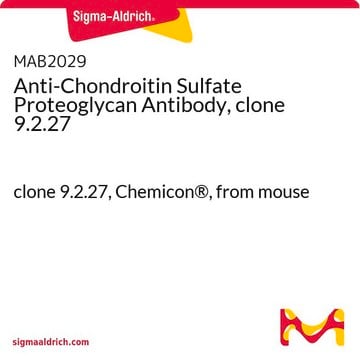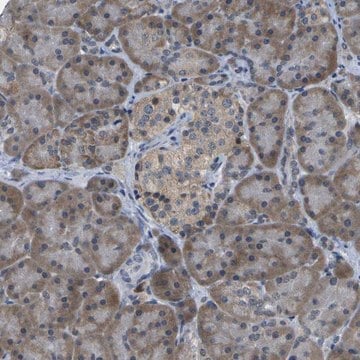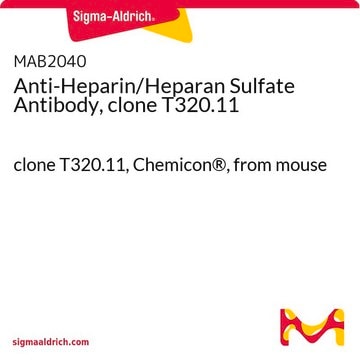C8035
Monoclonal Anti-Chondroitin Sulfate antibody produced in mouse
clone CS-56, ascites fluid
Sinônimo(s):
Chondroitin Sulfate Antibody, Chondroitin Sulfate Antibody - Monoclonal Anti-Chondroitin Sulfate antibody produced in mouse, Cs56 Antibody
About This Item
Produtos recomendados
fonte biológica
mouse
Nível de qualidade
conjugado
unconjugated
forma do anticorpo
ascites fluid
tipo de produto de anticorpo
primary antibodies
clone
CS-56, monoclonal
reatividade de espécies
chicken, bovine, mouse, human, pig, rabbit, rat
técnica(s)
indirect immunofluorescence: 1:200 using bovine mammary gland epithelial (BMGE) cells
microarray: suitable
Isotipo
IgM
nº de adesão UniProt
Condições de expedição
dry ice
temperatura de armazenamento
−20°C
modificação pós-traducional do alvo
unmodified
Informações sobre genes
human ... ACAN(176)
mouse ... Acan(11595)
rat ... Acan(58968)
Descrição geral
This product can be found as purified product that was produced using cell culture hybridoma (SAB4200696)
Especificidade
Imunogênio
Aplicação
- in immunohistochemistry as primary antibody to study of spinal cords and brain cryosections.
- in ELISA and western blot for purification of soluble forms of myelin-associated glycoprotein (MAG) and neural cell adhesion molecule (N-CAM).
- in flow cytometry studies.
- as primary antisera in a study of TGF-β regulation.
Ações bioquímicas/fisiológicas
Armazenamento e estabilidade
For extended storage, the solution may be frozen in working aliquots. Repeated freezing and thawing is not recommended. Storage in "frost-free" freezers is not recommended. If slight turbidity occurs upon prolonged storage, clarify the solution by centrifugation before use.
Outras notas
SAB4200696 Anti-Chondroitin Sulfate antibody, Mouse monoclonal
clone CS-56, purified from hybridoma cell culture
Exoneração de responsabilidade
Not finding the right product?
Try our Ferramenta de seleção de produtos.
produto relacionado
Código de classe de armazenamento
12 - Non Combustible Liquids
Classe de risco de água (WGK)
WGK 1
Ponto de fulgor (°F)
Not applicable
Ponto de fulgor (°C)
Not applicable
Certificados de análise (COA)
Busque Certificados de análise (COA) digitando o Número do Lote do produto. Os números de lote e remessa podem ser encontrados no rótulo de um produto após a palavra “Lot” ou “Batch”.
Já possui este produto?
Encontre a documentação dos produtos que você adquiriu recentemente na biblioteca de documentos.
Os clientes também visualizaram
Artigos
Glycosaminoglycans are large linear polysaccharides constructed of repeating disaccharide units.
Nossa equipe de cientistas tem experiência em todas as áreas de pesquisa, incluindo Life Sciences, ciência de materiais, síntese química, cromatografia, química analítica e muitas outras.
Entre em contato com a assistência técnica















